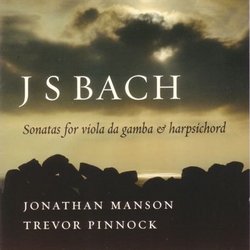| All Artists: Jonathan Manson, Trevor Pinnock Title: Johann Sebastian Bach: Viola da Gamba Sonatas Members Wishing: 0 Total Copies: 0 Label: Avie Original Release Date: 8/29/2006 Release Date: 8/29/2006 Album Type: Import Genres: New Age, Classical Styles: Instrumental, Chamber Music, Forms & Genres, Sonatas, Historical Periods, Baroque (c.1600-1750), Classical (c.1770-1830), Instruments, Reeds & Winds Number of Discs: 1 SwapaCD Credits: 1 UPC: 822252209327 |
Search - Jonathan Manson, Trevor Pinnock :: Johann Sebastian Bach: Viola da Gamba Sonatas
 | Jonathan Manson, Trevor Pinnock Johann Sebastian Bach: Viola da Gamba Sonatas Genres: New Age, Classical |
Larger Image |
CD Details |
CD ReviewsBach's Most Galante Style Giordano Bruno | Wherever I am, I am. | 05/21/2007 (5 out of 5 stars) "The viola da gamba sonatas are strikingly different from the solo cello sonatas -- less moody, less profound, but wonderfully melodic and decorative. In a sense, they look forward to the courtly styles of Bach's sons rather than to the spiritual/intellectual style of Bach Senior. This performance is aptly praised by the previous reviewer, Mr. Konczal. I'll offer a curious tip: because of the relatively equal dynamics of these pieces, unlike most of Bach,they can be "heard" nicely on a car audio system. I often listen to them on long drives." Vigorous performances that will please fans of Bach or Baroq Eddie Konczal | 05/19/2007 (5 out of 5 stars) "Is there room in the world of recorded music for yet another Bach CD? Of course - especially when the results are this good. Harpsichordist Trevor Pinnock and violist Jonathan Manson deliver vigorous performances of Bach's Sonatas for viola da gamba and harpsichord, achieving a rich texture and visceral beauty that should appeal to any Bach or Baroque fan.
Bach's three sonatas for viola da gamba and harpsichord (BWVs 1027, 1028 and 1029) comprise most of the running time. Pinnock and Mason present them out of sequence, opening with the sonata in G minor (BWV 1029) so that its lively first movement begins the disc. Bach's use of ritornello (recurring motifs which reappear in fragments to establish thematic unity) infuses this work with a concerto-like quality. BWVs 1027 and 1028 follow; in these, Bach follows the four-movement, slow-fast-slow-fast form developed by Italian composers such as Corelli. The program ends with Sonata in G minor (BWV1030b). Bach may have written the top part for oboe, rather than viola da gamba, but it's hard to quibble with Pinnock and Manson's interpretation. Highly recommended for anyone who appreciates Baroque music or the works of J. S. Bach." |
